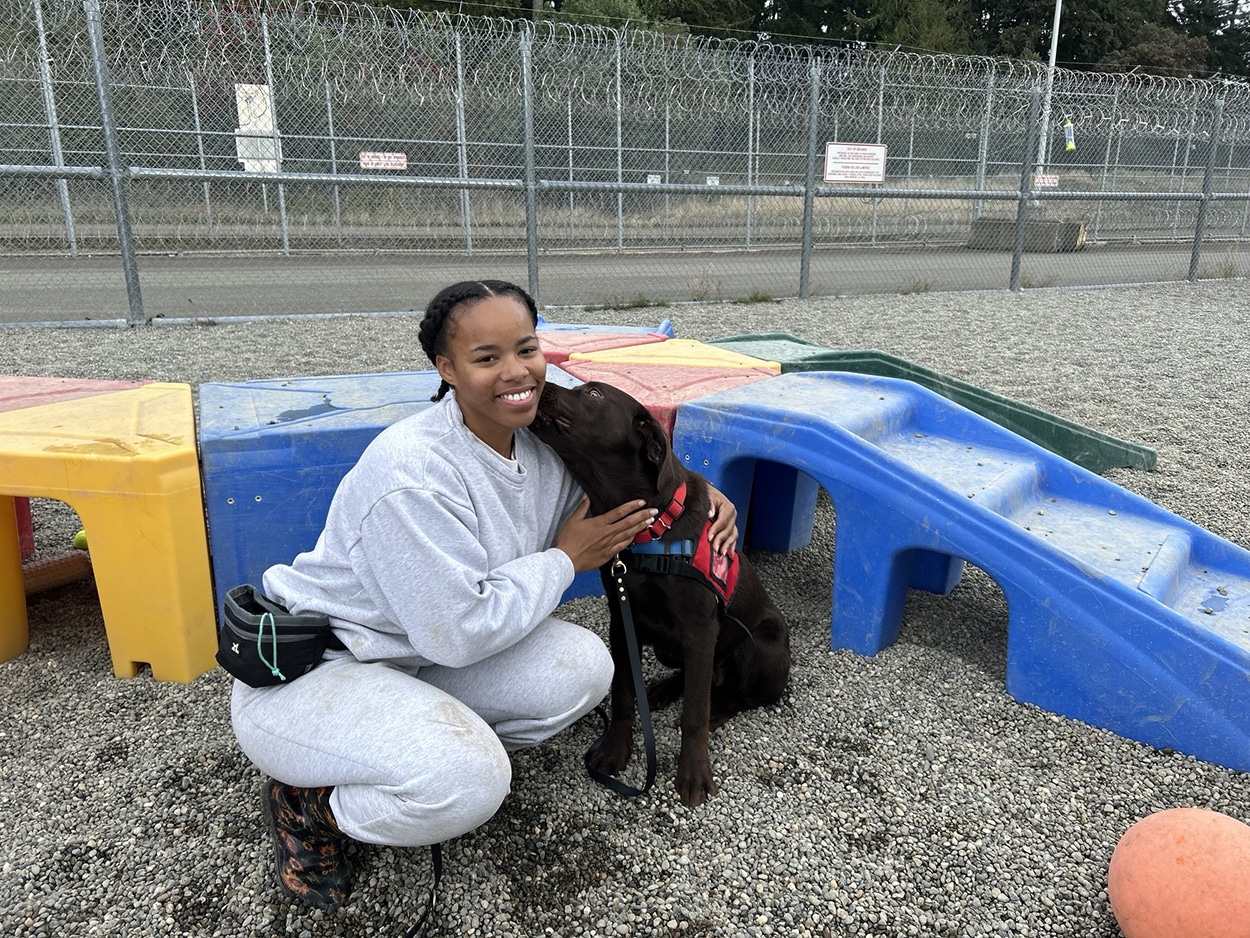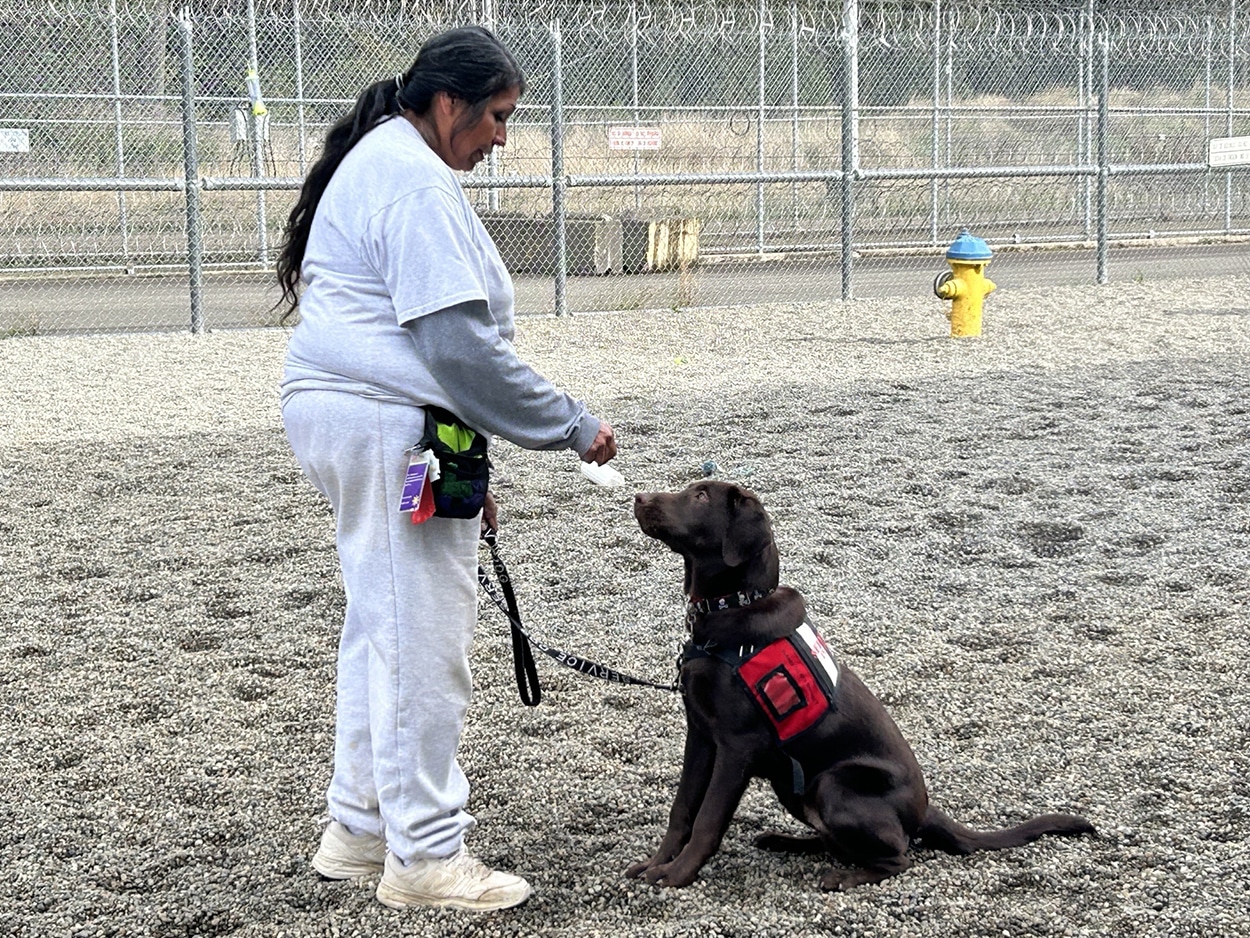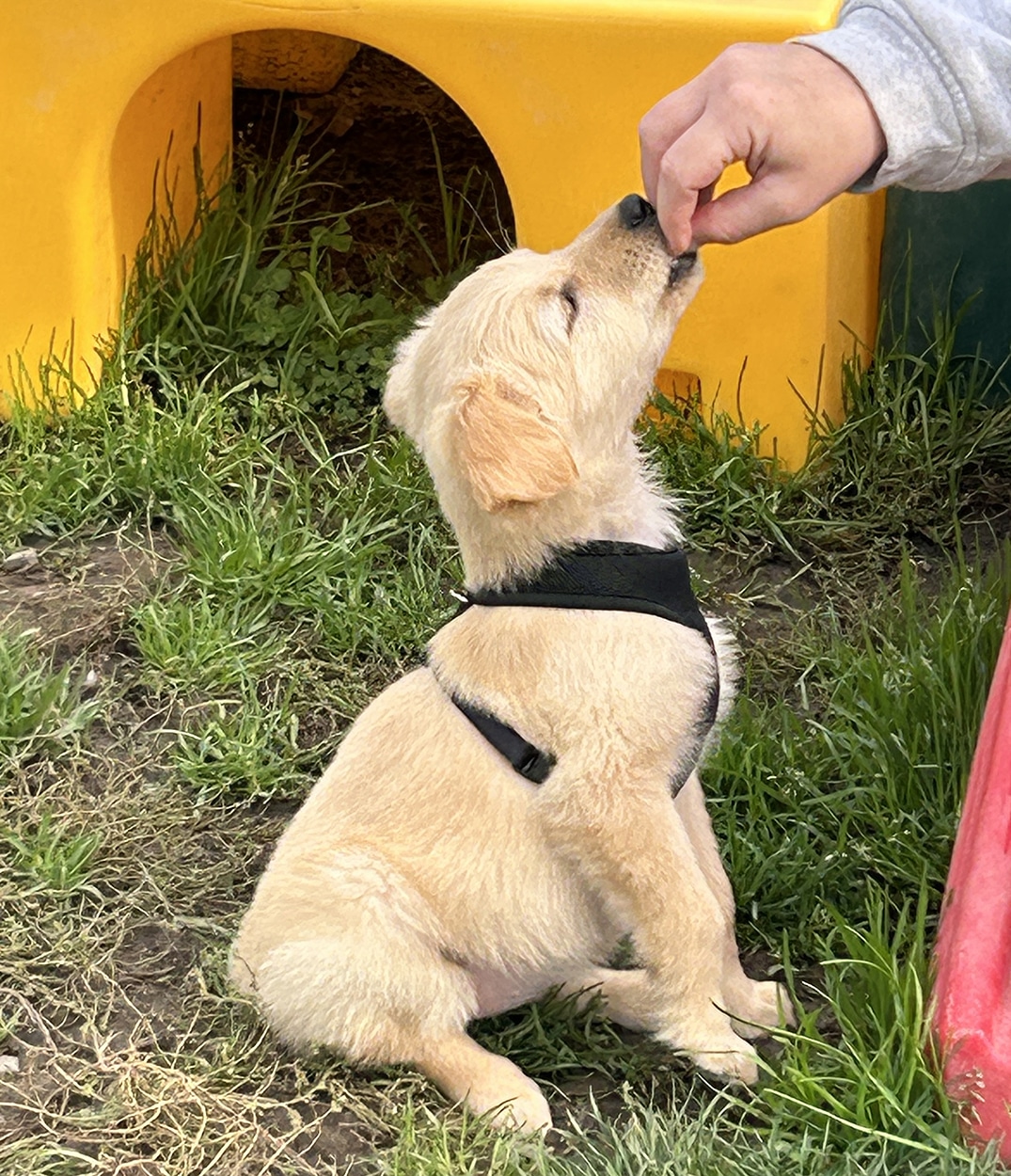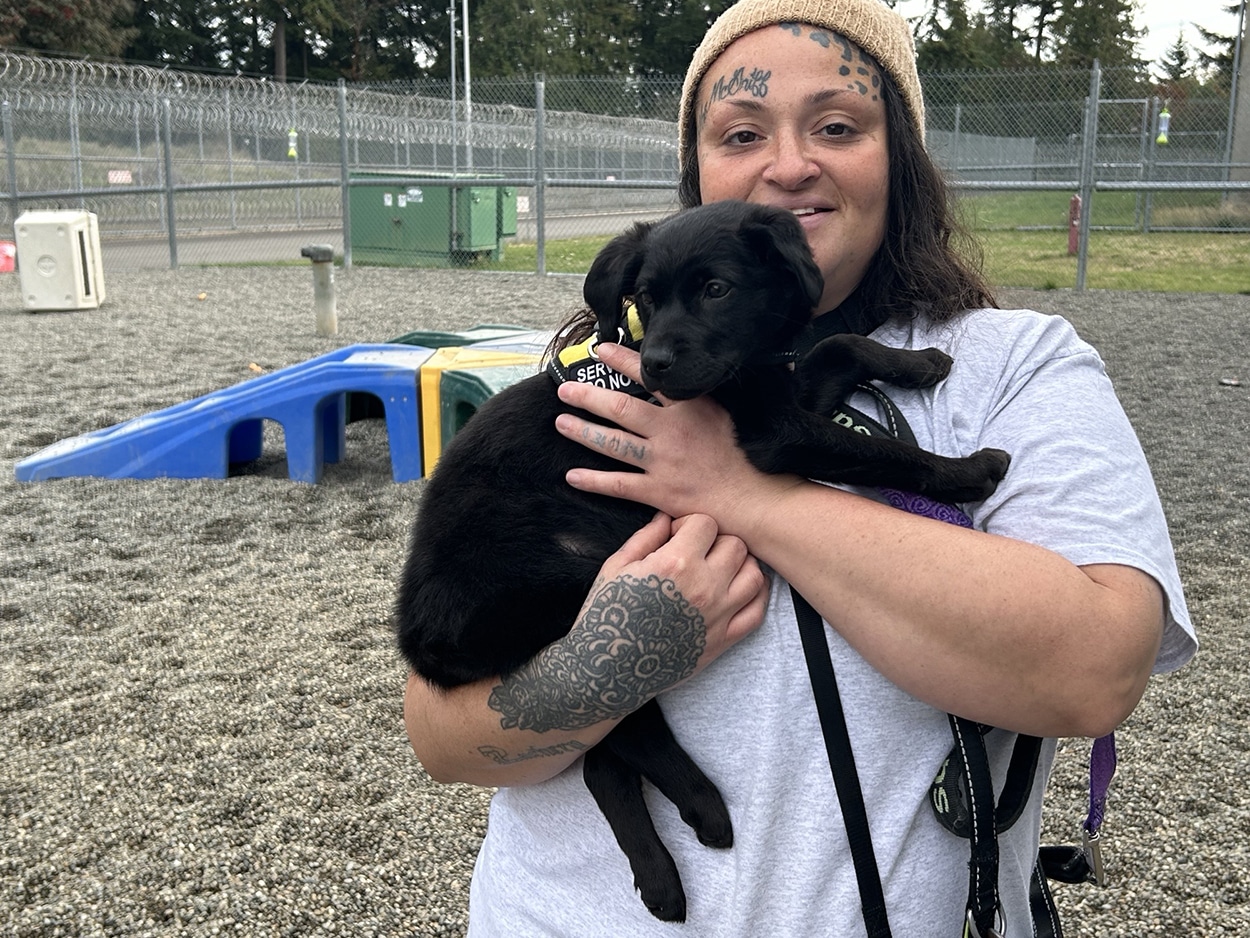Community
Prison Pet Partnership provides training for incarcerated women — and service dogs for those who need them
Hdaiya Collins was thrilled when she was invited to become a service dog trainer. She paired up with Sparrow, a beautiful Labrador retriever, when he was 3 months old.
Community Sponsor
Community stories are made possible in part by Peninsula Light Co, a proud sponsor of Gig Harbor Now.
He’s now 6 months old and has been living with Collins at the Washington Corrections Center for Women in Gig Harbor and walking the grounds as he learns basic commands.
“When they came to my room, and asked me if I wanted to (become a trainer), I started bawling,” Collins said. “He’s taught me a lot of patience, and he’s unleashed a passion for me, and set me up for something in my future.”

Hdaiya Collins takes a break from training with Sparrow. Photo courtesy of Melissa Johnson
Prison Pet Partnership
Sparrow is one of a litter of five chocolate lab puppies recently donated to the WCCW’s Prison Pet Partnership program. He is one of the two puppies from that litter who the program deemed a service dog candidate. (The others did not pass the test to become service animals and were adopted out as pets.)
Twenty-seven women are currently part of the Prison Pet Partnership program at WCCW. Most groom, board and handle dogs.
Collins is part of a smaller group of women who train dogs for specific service to those who need them for more independent living.
The training process can take up to two years. During that time, the women live with their assigned animal, caring for them, and teaching basic commands.
Puppy problems
The schedule can be challenging during those early months, said Amalia Castillo, who trains Puffin. Puffin is the third dog that she has trained. She said in those first few months, it’s like having a new baby.
“I first set my alarm for every two hours for about a week to take him out to potty, and then every three hours, then four, and now he’s on a schedule so that his last potty break is at 8 p.m.,” Castillo said.
Her day begins at 5 a.m. This schedule works for her and Puffin now, but his schedule likely will change when he goes to the long-term foster home. Such homes train service animals to handle crowds, people and social situations.

Amalia Castillo works with Puffin on basic commands. Photo courtesy of Melissa Johnson
“They have to fit in with the family,” she said. “He sleeps on a mat on the floor, and sometimes we do take a nap together, but at night, for safety, he has to be in the crate.”
Making a difference
Sansa is a 9-week-old black lab that enjoys the warmth of the arms of her trainer, Danielle Carter. Sansa is Carter’s first hopeful service animal trainee.
Carter said that not only has she gained knowledge through the grooming school at WCCW, she also can make a difference in someone’s life by training Sansa.
“This has changed the path of what I’m going to do in the future,” Carter said. “There’s not a job in the prison anything like working here, and you gain a new sense of yourself, and you’re able to help give back someone’s independence.”
She said training a service dog can take several years, depending on what their person needs help with. When the puppies come back from socialization training with their foster families, the women resume training that focuses on specific service training for their new owner.
It takes 22 to 24 months to fully train the puppies, said Sam Zuanich, dog behavior director of the program.
“They get an assessment at 6 months to see if they are appropriate to be a service dog, and another assessment at 15 to 18 months. If they don’t make it then, they can become a therapy dog, or a facility dog, or be placed in other work areas,” Zuanich said.
Prison Pet Partnership pioneers
Many other countries have initiated similar programs and more than half of the prisons in the United States have started pet programs. But the WCCW program, which started in 1984, was the first of its kind in the world.
The program provides the service animals free of charge to recipients, who will then gain independence with the help of the dog, Johnson said.
The WCCW has three education areas that focus on animals: boarding, grooming and dog handling. Some of the women cross over from boarding and grooming, but service dog trainers must first complete a skills class that teaches foundational handling, Johnson said.

Daenerys, a golden Lab recently donated to the Prison Pet Partnership program at the Washington Corrections Center for Women in Gig Harbor. The dogs come to the women already named. Daenerys, in addition to being a character in Game of Thrones, means Lady of Light. Mathis likes the name, and agrees, the dog is a light in her life. Photo courtesy of Melissa Johnson
“They demonstrate their understanding through work with dogs in our boarding, daycare, and board-and-train programs before being assigned a dog to train within their unit,” she said.
The women receive on-the-job training and weekly classes led by Zuanich, and also a group session with an outside instructor, Johnson said.
The idea of living with a pup for so many months, then letting it go to a new home, can be a difficult transition for the trainers. But Johnson said that the monthly meetings address this by focusing on the dogs’ journey and purpose beyond the program.
“This helps trainers view themselves as a part of each dog’s path to support someone’s independence,” she said. “Experienced trainers also mentor newer trainers.”
Program goals and eligibility
To be eligible for the service dog training program, participants must attend vocational education and dog-handling classes. The program excludes women who committed crimes against any vulnerable population. It also excludes inmates who committed infractions within the past year at WCCW.
Women who are eligible can earn pet care technician, groomer, dog trainer, and veterinarian assistant certificates. Program director Olivia Simons said 14 women are in the service training part of the PPP. A nonprofit pays for everything from the services that are provided to the public, like grooming, and boarding of animals, as well as the donations and grants that the program receives.

Daneille Carter said her experience with the pet programs has changed her outlook for her future, and she plans to use the certificates that she will gain from working with animals in her life after WCCW. Photo courtesy of Melissa Johnson
“We need more volunteers,” Simons said. “Puppy fostering, grant writing, events, or anything to help expand our program.”
According to the WCCW, recidivism of program participants is less than 3% within three years of release, compared to the Washington state rate of 20%. And since 1984, the program has placed more than 700 dogs and cats in either service, a facility, or in therapy programs.
The service dog program’s mission is three-fold. It provides job skill training to help people secure post-release employment. It rescues animals and places them in loving homes. And it helps people with disabilities secure service dogs.
WCCW offers grooming and boarding of pets to the community. For more information on fees, and to schedule an appointment, visit prisonpetpartnership.org or call 253-858-4240.

